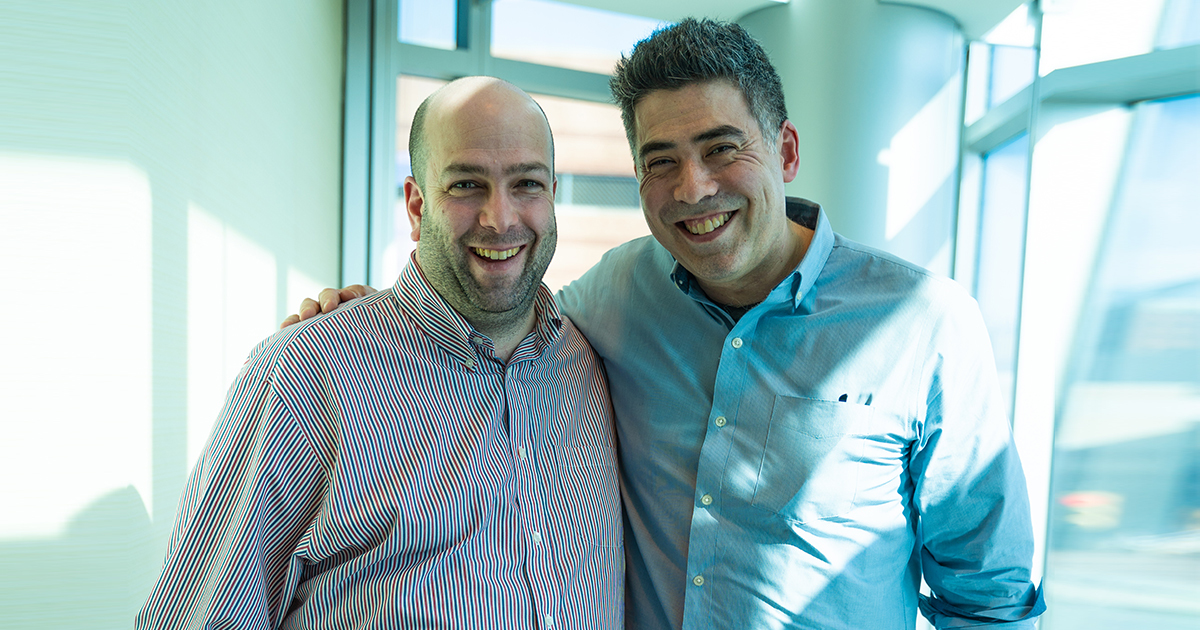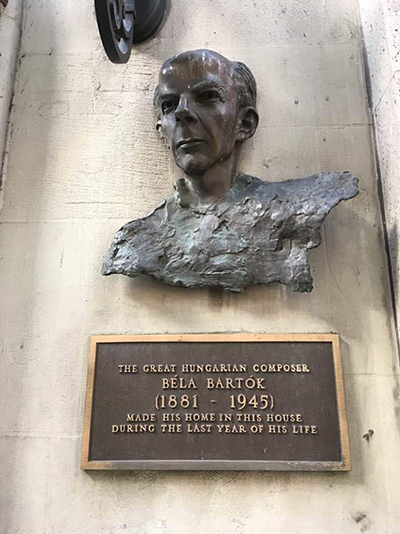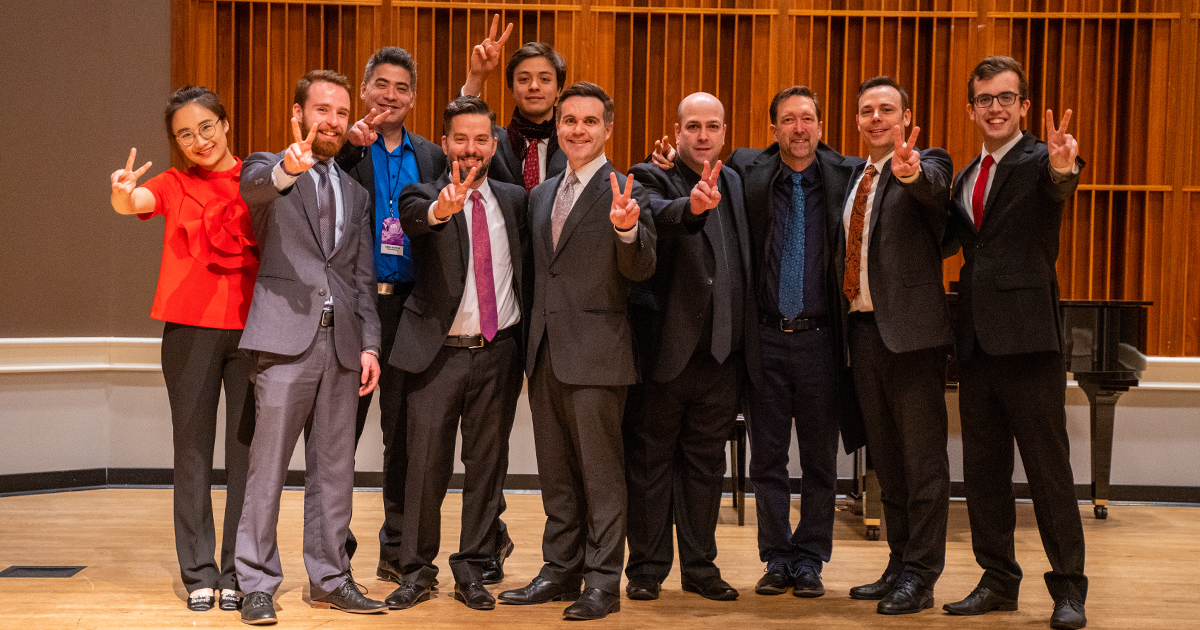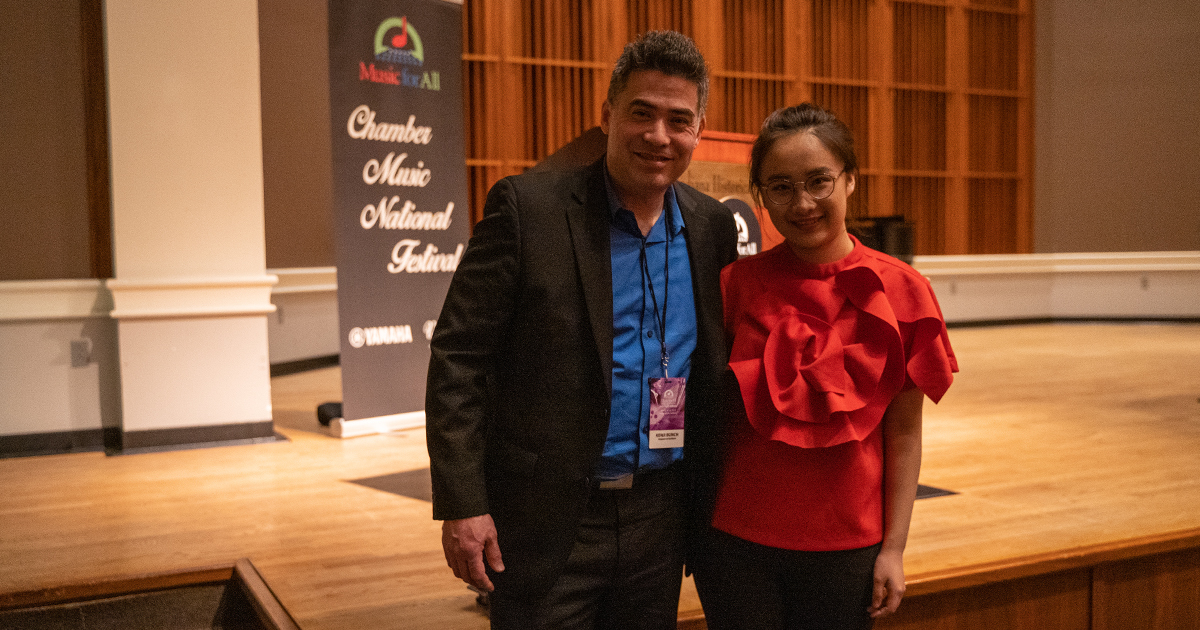Kenji Bunch: 2019 Vandoren Emerging Artist Composer
Date Posted: September 17, 2019

David Gould: Tell us a little bit about your background. You are a violist and composer...
I'm from Portland, OR and I started on piano and violin when I was young (5) and switched to the viola when I was 13. I was never a prodigy by any means, but once I switched to the viola, things clicked, and I got serious about it.
It was a summer in the Boston University Tanglewood Institute (BUTI) program which weirdly involved the clarinet, too. My youth orchestra in Portland would send one person every summer to that festival on a scholarship. I auditioned for that and was the runner-up to a clarinetist. Then at the last minute she was unable to go due to an injury. I stumbled into music that way and that was an important experience. I decided I wanted to pursue it and go to a conservatory, so I went to Juilliard as a violist.
At the time I had no ambitions beyond being a violist and playing in an orchestra. As soon as I got there, I got into composing. I always had an interest in it and always been fascinated by composers, but I just never had the theory background. I didn't even make first-year theory. I worked my way out of there and I took to the subject.
Then Eric Ewazen was my teacher for a couple of years and could tell I had this interest in composing and encouraged me. He would tutor me on the side and help me put together a portfolio to study composition formally. I did that as my graduate degree; a double major in viola and composition.
The year after I left (Juilliard), I played in a string quartet professionally for 6 years, the FLUX Quartet, and in 1998 I was selected by Young Concert Artists as their Composer-in-Residence. Those two things helped me get my career started in both areas. I never felt the need to choose one over the other: they've both helped each other. I'm a better violist from composing and I’m certainly a better composer for being a performer. The goal of the present is to keep doing both things until somebody makes me stop.
DG: How did you go about this particular commission? What’s the backstory?
In New York City, 57th and 9th Ave., there's a building on the corner with a plaque that says exactly the title of my piece: "The Great Hungarian Composer Béla Bartók Made His Home In This House During the Last Year of His Life." I came to New York City in '91 and I would walk by that and every time I walked by that plaque, it would stop me in my tracks. Here he was, one of the giants of the 20th century, dying of leukemia, wasting away penniless while also writing furiously some of the best music of his career. So I was thinking about how he was doing that unnoticed amid the chaos of New York City.

Plaque of Béla Bartók, NYC
The more I thought about it, the more I said there's some music in that story of one of my favorite composers. Bartók has been a huge influence. You don't hear it in my music, except for this piece, in which I've intentionally paid tribute to him. One of the first things I remember playing as a young violinist - I have a brother who's a year older and we would play the Bartók duos, a famous collection of 44 duos for 2 violins. Bartók was incredibly committed to music education, developing young, creative musicians, and also to recording the folk music of his region and his time. As important as he was as a composer, he's equally important as an ethnomusicologist. Those early experiences were a huge influence.
Then in high school, I spent a solid year, year and a half, working on the Bartók Violin Concerto. That really helped me advance on the instrument and as a player. The music is in my fingers, in my blood, and I didn't realize how fun it would be to write "fake" Bartók (laughs). I didn't want to quote anything directly, but I wanted it to sound like the music of Bartók. He has a pretty distinctive vocabulary. I found it fun and not that difficult to try and write in that style. There's a lot of that interspersed with jarring breaks into sounds that you would hear in NYC in 1945. I have some very near direct quotes of popular songs: jazz, movie score, etc. that were going on at the time.
DG: How was it writing for a clarinet? Did you have to think about anything differently?
It's always harder for me to write for winds. I've been lucky and pleasantly surprised how acceptable my music seems to have been for wind players thus far. I'm hoping that it lies on the instrument well. I don't have the background on the instrument. With strings, I can have a sense what it will feel like to play it. The big difference is how we don't think about breathing the same way. I always have to consciously remind myself that this is a human that needs to breathe to play this music. I'm always telling my students that, too.
Wind players are much more concerned with details about articulation. It's a more physical experience than something you do with a bow and a string. As long as my luck doesn't run out, I'll keep writing for winds!

Music for All National Conference, March 2019
"I think we're seeing a new breed of musician who's versatile and flexible..." - Kenji Bunch
Rebecca Scholldorf: Did you listen to other Bartok wind excerpts to pull from?
I thought I was going to have to do more research but it came pretty easily. I did listen to the “Concerto for Orchestra” because that was written in his last year. I wanted to have that character of that piece seep into my piece. There's one hidden quote of Shostakovich's 7th Symphony which Bartók strangely quotes in that piece. I thought that was fair game (laughs). There are some gestures that are similar to his wind writing in his Concerto for Orchestra.
RS: For you as a composer, where do you see composition moving in the next 5-10 years?
I'm particularly impressed by the younger generation of musicians. The facility they have not only technically on the instruments, but a broader understanding of and awareness of how to play in different styles and seamlessly go back and forth between them, seems way more advanced than where I was at that age. I think there's going to be more of that. I think there's going to be more of a blend. It's gotten to a point where a term like "crossover" is meaningless now. The blurring of genres is so frequent. It's done so much and so well, it's a little pointless to try and maintain one genre. I think we're seeing a new breed of musician who's versatile and flexible in skills that can incorporate different styles, elements of improvisation, etc. It's a different time.
DG: You as a performer, mixing genres...
I've always enjoyed that. I've played bluegrass fiddle for 15 years in a band. I've also played in an experimental improvising group. There are a number of different ways to play and I really enjoy that kind of work. As a performer myself, I got to the point where I could decide to try and continue to become the best classical violist I could, or I could try to do a bunch of other different things. That seemed like a more interesting journey for me personally. I find that these other things I do help my classical playing.
RS: When you listen to the premiere of your piece, are you listening to the interpretation of the piece or are you analyzing as its being played. Are you more structurally minded or how the performer is playing the piece?
It depends. With this piece, in particular, the musicians got what I was trying to do and I didn't need to say of what I intended in the music because it seemed like they knew.
Sometimes if I hear something I wrote a long time ago, it'll be hard to focus on the performance because I'm distracted by what my life was like at the time I wrote that piece. Other times I can really enjoy the piece. The longer I've been doing this the more I enjoy how different the same piece might sound when played by different performers. I've gradually given up the notion of control over a piece. I like that. I like putting it out there and it takes on its own life. It's a real privilege to have multiple performances of anything. I'm happy to have something played more than once. If they are, I enjoy the variety in interpretations.

Kenji Bunch and 1st Prize 2019 VEA Winner for clarinet Ning Zhang
DG: What's next?
I'm at a very rare moment in my career where I've caught up. I wrote a piano concerto and a couple of smaller chamber works, in addition to this. I'm taking a breather for a second. I'm going to write a dance score for a choreographer I work with: Darrell Moultrie.
DG: What's your composition process like?
I've got two kids and I make that a priority. They're young so I want to be present and as a result, I end up doing a lot of my work super early. I'll get up at 4/4:30AM. I really like that time because I feel like I can get a lot of work done. I usually front-load the day that way and get something accomplished early. If I'm not too fried, I'll hit it again.
DG: What's your next playing gig?
I run a new music group in Portland called Fear No Music. My wife is the executive director and I'm the artistic director. It's a lot like marriage...I come up with these goofy ideas and she asks how we're going to pay for it...
RS: What is one thing that you wished a performer would understand about working with a composer?
I understand both sides of that. It's funny because a lot of times as a performer if I'm playing another composer's work, even at this level of being a professional for 27 years, you still feel like there's pressure of impressing the composer or not getting busted for playing stuff wrong. You feel like you have to please this person and I don't know why we do this to ourselves. I wish performers would chill out about that because they don't need to worry. Most of us composers are grateful to have people playing our stuff. We're nervous, too! I think from both ends, people are just trying to do their best and each should appreciate the situation they're a part of.
Kenji Bunch represents his hometown of Portland, Oregon as “one of the leading American composers of his generation, best known for amalgamating traditional American musical forms.” (Oregon ArtsWatch) While conservatory trained at The Juilliard School, Bunch infuses his music with folk and roots influences achieving an authentic and seamless blend of classical and vernacular styles. “Clearly modern but deeply respectful of tradition and instantly enjoyable,” (The Washington Post) his music has inspired a new genre classification. “Call it neo-American: casual on the outside, complex underneath, immediate and accessible to first-time listeners… Bunch’s music is shiningly original.” (The Oregonian) Deeply sensitive to history, philosophy, and the ways in which the arts are shared intergenerationally and cross-culturally, Bunch incorporates a variety of world music style references which aptly mirror the diversity of international influence on modern American society. Sly, irresistible grooves pepper his work, revealing a deft ability to integrate bluegrass, hip hop, jazz, and funk idioms. His rich, tonal harmonies and drawn-out, satisfying builds have wide emotive appeal that easily lend themselves to dance and film. Over sixty American orchestras have performed Bunch’s music, which “reache(s) into every section of the orchestra to create an intriguing mixture of sonic colors.” (NW Reverb) Recent works include commissions and premieres from the Seattle Symphony, the Oregon Symphony, the Lark Quartet, the Britt Festival, Music From Angel Fire, Chamber Music Northwest, the Eugene Ballet, and the Grant Park Music Festival. His extensive discography includes recordings on Sony/BMG, EMI Classics, Koch, RCA, and Naxos labels among others. Also an outstanding violist, Bunch received both Bachelor and Master of Music degrees in viola and composition from the Juilliard School and was a founding member of the highly acclaimed ensembles Flux Quartet (1996-2002) and Ne(x)tworks (2003-2011). Bunch currently serves as Artistic Director of Fear No Music, and teaches viola, composition, and music theory at Portland State University, Reed College, and for the Portland Youth Philharmonic.
Subscribe to the We Are Vandoren E-newsletter (WAVE) to receive 4 weekly articles for Performers, Students, and Educators